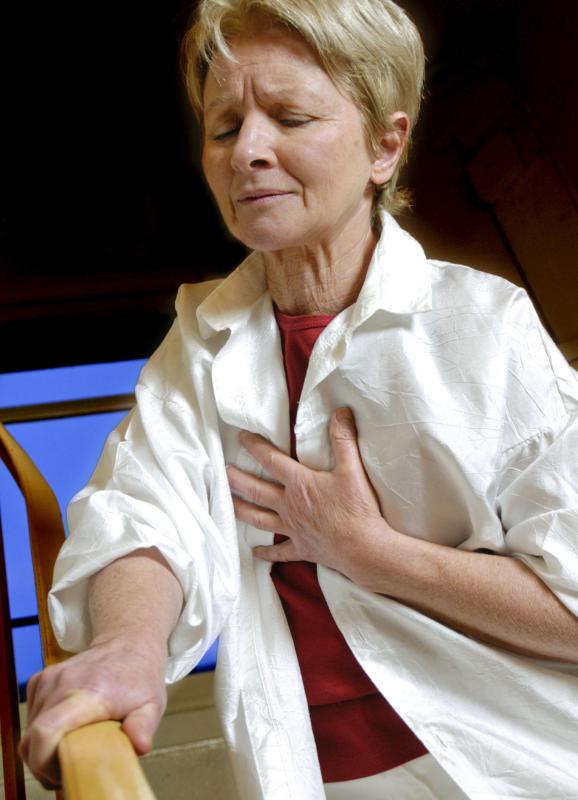At TheHealthBoard, we're committed to delivering accurate, trustworthy information. Our expert-authored content is rigorously fact-checked and sourced from credible authorities. Discover how we uphold the highest standards in providing you with reliable knowledge.
What is Paraseptal Emphysema?
Paraseptal emphysema refers to inflammation and tissue damage to the distal airways and alveolar sacs near the outer boundaries of the lungs. While more common types of emphysema impair major airway structures and disrupt normal airflow, paraseptal emphysema is unlikely to cause noticeable breathing problems in its initial stages. Many cases remain undiagnosed and untreated for several years, and complications may never occur. It is possible, however, for this type of emphysema to cause a lung to collapse or progress to envelop larger areas of lung tissue. Treatment depends on the severity of lung damage and may involve medications, surgery, or both.
Adults between the ages of 18 and 30 are at the highest risk of developing paraseptal emphysema, though doctors are not sure why that is the case. The disease is likely related to an inherited defect or an autoimmune condition. Some cases arise later in life in combination with another type of emphysema as a complication of long-term smoking. The condition usually presents by itself in young adults, though older people often suffer from chronic bronchitis as well.

The alveolar sacs that are affected in paraseptal emphysema sit very close to the pleura, or lung lining. Sacs become inflamed and enlarged, which limits the rate and amount of air that can be passed through them. Distal airways are not as vital as larger structures in the middle of the lungs, so a person may not have significant breathing difficulties. If symptoms are present, they may mimic asthma symptoms of coughing, shortness of breath, and fatigue.

The proximity of inflamed alveoli to the pleura presents the risk of damage to the lung lining. If the pleura is compromised, air can escape into the chest cavity and result in a collapsed lung. Paraseptal emphysema frequently goes undiagnosed until it is found incidentally when a patient receives treatment for a collapsed lung. X-rays, computerized tomography scans, and lung biopsies help doctors confirm the presence of emphysema.

If paraseptal emphysema does not cause problems, it might not need to be treated at all. Patients are simply encouraged to attend regular checkups to make sure problems do not arise. Any breathing difficulties can usually be relieved with bronchodilator inhalers, which help to relax and open the airways for easier breathing. If emphysema spreads and inflames major structures, a surgeon may need to excise part or all of a lung. Physical therapy and ongoing medical care may be necessary if surgery is performed.
AS FEATURED ON:
AS FEATURED ON:
















Discussion Comments
Smoking plain and natural tobacco does not cause disease; it is all the "addictive chemicals" big tobacco(tobacco corporations) put in cigarettes that causes addiction and disease. That is why big government nailed big tobacco with billions in fines but let's them keep on poisoning the people. Corporations run our country, own our country, big corporations are our enemy, greed is the true enemy not Russia, terrorists or Satan.
I suffer from this condition and even if I smoked, it was just for a short period of time and not even half a pack a day, so I doubt it was just smoking who caused it. Maybe smoking made the underlying condition noticeable or helped it collapse my lung.
Monika, I don't particularly care what people think so I have no problem telling them what I have. I don't understand why people should be sympathetic to my problems anyway - those that should like your family or friends would help you regardless of how you got a disease and I don't understand why the sympathy of random people should matter to anyone. I'd actually hate if people felt pity for me and treated me like I'm some kind of handicapped person. I actually think it is demeaning to people to treat them with gloves just because they suffer of something.
@Monika - I think that is a very valid thought. People often do attach stigmas to certain kinds of diseases which in my opinion isn't constructive for anyone.
It seems like a greater fear for this disease would be difficulty of diagnosis. Since the symptoms are similar to asthma I can see how it would be easy to misdiagnose. And as the article says paraseptal emphysema can result in a collapsed lung which doesn't sound good. Although I guess doctors do keep a pretty close eye on asthma so at least the patient would be getting some kind of care.
I didn't know there was any other kind of emphysema than the smoking related kind. I would imagine it would be really tough to have paraseptal emphysema because of the stigma that emphysema is caused by smoking.
I know a lot of people who think diseases caused by smoking or drinking are the patients fault. People who think this way generally aren't very sympathetic towards people with emphysema. I'm sure more than few people with parseptal emphysema avoid telling people the actual name of their condition. I don't blame them a bit!
Post your comments